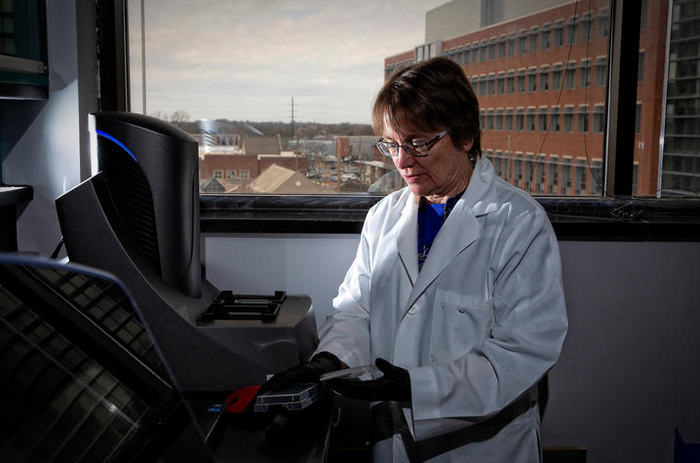LEXINGTON, Ky. (Aug. 19, 2022) — Linda J. Van Eldik, Ph.D., director of the University of Kentucky Sanders-Brown Center on Aging, is part of a $1.5 million grant to help further research into a possible treatment for Alzheimer’s disease. A four-year grant from the National Institute on Aging of the National Institutes of Health to Northwestern University includes a $611,676 subaward to UK. Van Eldik, the Dr. E. Vernon Smith and Eloise C. Smith Alzheimer’s Research Endowed Chair, serves as principal investigator on UK’s award.

Credit: Mark Cornelison | University of Kentucky Photo
LEXINGTON, Ky. (Aug. 19, 2022) — Linda J. Van Eldik, Ph.D., director of the University of Kentucky Sanders-Brown Center on Aging, is part of a $1.5 million grant to help further research into a possible treatment for Alzheimer’s disease. A four-year grant from the National Institute on Aging of the National Institutes of Health to Northwestern University includes a $611,676 subaward to UK. Van Eldik, the Dr. E. Vernon Smith and Eloise C. Smith Alzheimer’s Research Endowed Chair, serves as principal investigator on UK’s award.
“This is a multi-principal investigator award, representing the continuation of a long-standing collaboration between myself and Dr. D. Martin Watterson at Northwestern, which has brought this promising small molecule drug candidate from concept to human trials,” said Van Eldik.
The funding will help move work forward on a brain-penetrant, small molecule drug candidate developed by Van Eldik and her colleagues called MW189. In 2020, Van Eldik reported the first human clinical study of MW189 that suppresses disease-induced inflammation and injury of the brain.
“This compound is currently in a phase 2a clinical trial as an intravenous formulation in patients with intracerebral hemorrhage,” said Van Eldik. “However, our long-term goal is to develop this drug as an oral formulation for patients with Alzheimer’s disease or other related dementias. To do this, we must fill remaining gaps necessary to bring MW189 to a future clinical study in Alzheimer’s patients.”
Van Eldik lays out several steps to reaching that long-term goal. First, the team will need to produce a new batch of clinical drug substance and oral drug product manufactured in compliance with recent FDA guidance on drug quality for human clinical trials that may require daily oral administration for years. Second, researchers will need to perform extended toxicology studies in two animal species to provide refined dosing parameters for long-term administration in humans. The last step will be obtaining authorization for an investigational new drug application for future clinical trials in early Alzheimer’s disease and related dementias.
“At the end of this project, we will be positioned to immediately proceed to a phase 2a clinical study of Alzheimer’s disease patients. This drug has the potential to be a first-in-class disease-modifying therapy for Alzheimer’s disease and related dementias,” said Van Eldik. “In addition, because the drug acts on a mechanism that drives disease progression or susceptibility in multiple central nervous system disorders with dysregulated inflammation, this work could have scientific impact in a number of different brain disorders.”
Research reported in this publication was supported by the National Institute on Aging of the National Institutes of Health under Award Number U01AG076480. The content is solely the responsibility of the authors and does not necessarily represent the official views of the National Institutes of Health.
The University of Kentucky is increasingly the first choice for students, faculty and staff to pursue their passions and their professional goals. In the last two years, Forbes has named UK among the best employers for diversity, and INSIGHT into Diversity recognized us as a Diversity Champion four years running. UK is ranked among the top 30 campuses in the nation for LGBTQ* inclusion and safety. UK has been judged a “Great College to Work for” three years in a row, and UK is among only 22 universities in the country on Forbes’ list of “America’s Best Employers.” We are ranked among the top 10 percent of public institutions for research expenditures — a tangible symbol of our breadth and depth as a university focused on discovery that changes lives and communities. And our patients know and appreciate the fact that UK HealthCare has been named the state’s top hospital for five straight years. Accolades and honors are great. But they are more important for what they represent: the idea that creating a community of belonging and commitment to excellence is how we honor our mission to be not simply the University of Kentucky, but the University for Kentucky.




